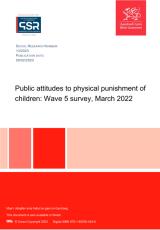This report builds on findings from 2018, 2019, 2020 and 2021 on attitudes towards physical punishment of children, and the Children (Abolition of Defence of Reasonable Punishment) (Wales) Act 2020.
This is not the latest release in the series: Public attitudes to physical punishment of children
Series information:
Main findings
Attitudes towards smacking
- In each wave more respondents disagreed with the statement ‘it is sometimes necessary to smack a child’ than agreed, with older respondents (55+) more likely to agree with it than other age groups.
- In March 2022, 62% disagreed and 23% agreed with the statement ‘it is sometimes necessary to smack a child’. The difference between the proportions disagreeing and agreeing has widened in comparison to the 2021 survey (53% disagreed, 30% agreed).
- 27% of men agreed with the statement ‘it is sometimes necessary to smack a child’ compared with 19% of women. Both genders were less likely to agree with the statement less than in 2021 (36% of men and 25% of women).
Knowledge of current legislation
- 84% of people surveyed in March 2022 thought that the law did not allow parents to smack their children, 6 percentage points more than in 2021. 10% thought the law did allow parents to smack (6 percentage points fewer than in 2020) and the remaining 6% reported being unsure (identical to in 2021).
Awareness of changes to legislation
- Levels of ‘unprompted’ awareness of the change in legislation in March 2022 (66%) have increased since 2021 (40%).
- Higher levels of ‘unprompted’ awareness were reported in all age groups and all social grade groupings in March 2022 compared with 2021.
- When prompted 78% of respondents knew something about the change, 16% more than in 2021.
- TV news / programmes was the most common source of information on the change.
Opinion of changes to legislation
- 59% of respondents were in favour of the change, up from 48% in 2021, the highest level of support across the five waves. 20% of respondents were against the change, down marginally from 24% in the 2021 and the lowest level of opposition across the five waves. Fewer respondents in March 2022 felt that they needed more information or were undecided (20% vs 28% in 2021).
- 16 to 34s and 35 to 54s were more likely to be in favour of the change (71% and 62% respectively) than those aged 55+. This is similar to in 2018, 2019, 2020 and 2021. However, March 2022 is the first survey in the series where those aged 55+ were more likely to support the change (46%) than to oppose it (29%).
- Women were more likely to be for the change than men (65% vs 52% respectively) and less likely to be against the change (14% vs 27% respectively).
- When asked why respondents were in favour of the change, the most common response was that they ‘[did] not agree with smacking or physical punishment of children’ (54% of those who were for the change.
Reports

Public attitudes to physical punishment of children: wave 5 March 2022 , file type: PDF, file size: 1 MB
PDF
1 MB
If you need a more accessible version of this document please email digital@gov.wales. Please tell us the format you need. If you use assistive technology please tell us what this is.
Data
Datasets and interactive tools
Public attitudes to physical punishment of children: March 2022 , file type: XLSX, file size: 84 KB
XLSX
84 KB
If you need a more accessible version of this document please email digital@gov.wales. Please tell us the format you need. If you use assistive technology please tell us what this is.
Contact
Benjamin Lewis
Rydym yn croesawu gohebiaeth yn Gymraeg / We welcome correspondence in Welsh.

